A HARD WEEK
For news junkies, those who like to discuss on facebook, pundits and social activists, it has been a hard week. There have been numerous controversial rulings from the Supreme Court—SCOTUS for those who write like wonks—and several of these rulings are deeply troubling to many of us or to our fellow citizens. From the obvious health care ruling to the HHS mandate forcing Catholics who work in partnership with federal programs to pay for contraception against their consciences, to the legality of colleges forcing campus ministry organizations to have people who do not share their convictions to be in leadership, there has been plenty of legal theories and legal rulings to consider. Not to mention Attorney General Holder being held in contempt for lying to congress, which, oddly, some think is justifiable and has caused a lot of heat on both sides. Some of us have ignored most of this, others are staying quiet, but reading, learning, keeping abreast, and others of us have been engaged in advocacy and debate. I’ve spent a few too many hours typing too furiously last week, so I know.
HHS mandate forcing Catholics who work in partnership with federal programs to pay for contraception against their consciences, to the legality of colleges forcing campus ministry organizations to have people who do not share their convictions to be in leadership, there has been plenty of legal theories and legal rulings to consider. Not to mention Attorney General Holder being held in contempt for lying to congress, which, oddly, some think is justifiable and has caused a lot of heat on both sides. Some of us have ignored most of this, others are staying quiet, but reading, learning, keeping abreast, and others of us have been engaged in advocacy and debate. I’ve spent a few too many hours typing too furiously last week, so I know.
Here, is why I bring this up. I am alarmed that too many brothers and sisters in Christ seem to be exceedingly loyal to one side or the other of our partisan divide without much qualification or without even much awareness or care that some sincere, informed, people of faith see things differently. This second problem demands greater humility, civility and ecumenicity. The first, however, is quite concerning to me because I don’t think the Bible and our best faith traditions permit being ideologically partisan without some qualification or nuance.
I have written before about and suggested resources on civility, and my, my, do we need that now. (See the Richard Mouw book, suggested, below.)
But we need more than civility. There is nothing wrong with being passionate and outspoken–we’ve tried to model and sell books about public engagement for decades. Last year we named A Public Faith (Baker; $21.99) by Miroslov Volf as one of the best books of the year! Still, with the loud animosities from both sides, not to mention the critical importance of the current issues and the upcoming election, I sincerely believe that now is the time to bone up on our views, dig deeply into what resources are available, and make sure we are truly thinking Christianly. We do need to be involved as citizens, even within political parties, but…
TWO ESSENTIAL TEXTS
 We are glad for your permission to speak into your already noisy world, and hope this essay is helpful. One of our core convictions—part of the story that animates why we review and sell the books we do—is utterly germane: the Bible, we believe, teaches quite specifically that we ought not to align ourselves too closely with any worldly ideology. Colossians 2:8 specifically warns us not to be “taken captive” by secular or pagan theories about things. I don’t know if you’ve heard sermons on this, but I think this means we shouldn’t be fundamentally, unequivocally, aligned with, say, free market capitalism or, say, with new age cosmic consciousness or, say, the sort of statism that suggests the government must solve every social problem. We must not carry water for alternative worldviews or, in this case, the political assumptions of the far left or the right. We can work with and for folks in either party, of course, and can be friendly with all, but our minds and views should be discerning and able to reject ideas and assumptions that are inconsistent with a Biblical view. For instance, I think we must distance ourselves from the collectivist visions that rely too much on Marxist views and I think we must distance ourselves from the individualist visions that rely too much on secular libertarians of the Enlightenment era of the 18th century. Otherwise we are accommodating our faith to those theories and ideologies; we are essentially “taken captive.”
We are glad for your permission to speak into your already noisy world, and hope this essay is helpful. One of our core convictions—part of the story that animates why we review and sell the books we do—is utterly germane: the Bible, we believe, teaches quite specifically that we ought not to align ourselves too closely with any worldly ideology. Colossians 2:8 specifically warns us not to be “taken captive” by secular or pagan theories about things. I don’t know if you’ve heard sermons on this, but I think this means we shouldn’t be fundamentally, unequivocally, aligned with, say, free market capitalism or, say, with new age cosmic consciousness or, say, the sort of statism that suggests the government must solve every social problem. We must not carry water for alternative worldviews or, in this case, the political assumptions of the far left or the right. We can work with and for folks in either party, of course, and can be friendly with all, but our minds and views should be discerning and able to reject ideas and assumptions that are inconsistent with a Biblical view. For instance, I think we must distance ourselves from the collectivist visions that rely too much on Marxist views and I think we must distance ourselves from the individualist visions that rely too much on secular libertarians of the Enlightenment era of the 18th century. Otherwise we are accommodating our faith to those theories and ideologies; we are essentially “taken captive.”
Besides this warning not to be hood-winked by bankrupt ideologies or views on things that aren’t consistent with a generous, thoughtful, Biblical understanding, we are called to do to more than resist bad ideas. We are to “take every thought captive” (2 Corinthians 10:5) which, given the meaning of the Greek word and the context of the passage, means every “theory” or idea we have. (That is, this phrase isn’t mostly about “taking captive” things like pride or lust or crummy thoughts about our self-worth, but ideas we have about, oh, say, the role of personal liberty or the task of the state or the use of taxes or the role of the military in foreign policy or how human develop should relate to the creation itself; it is about assumptions, ideas, and theories that we are to claim for Christ.) We are warned to not compromise our fundamental convictions by allowing them to be synthesized with other ideas that are not consistent with a Biblical view and we are mandated to think things through coming up with a positive, Christian alternative. Colossians 2:8 and 2 Corinthians 10:5 are two sides of a vital Biblical teaching regarding our theories and ideas and presuppostions about things and we should be self-aware enough to ask ourselves if our concerns and viewpoints (including the stuff we spread on facebook) illustrates this sort of intentionally Christian perspective on the ideas and issues. I know it is something I struggle with. How about you?
NO JUMBO SHRIMP
So, just for instance, for most of us, it would be a pretty strained stretch to consider oneself a “Christian Marxist” since Marxism, by definition, is atheistic, and committed to a violent view of power, captured by any means necessary. At best, we might be able to have a Christianly-influenced sort of Marxism, but even that would be synthetic. It wouldn’t be quite real Marxism anymore, but it wouldn’t be quite real Christianity any more, either. Nope, that just doesn’t fit well with the teachings of Jesus. It would be sort of like “jumbo shrimp.”
Recently, a fellow told me that a guy in his conservative, theologically-serious church has the jones for atheist novelist and social critic Ayn Rand; he’s a Tea-Party activist and a Glenn Beck fan and he thinks that the best way to counter what he thinks is our tendency towards atheistic socialism is by using one of the most significant atheistic libertarians of the 20th century. Does that make sense? Not weighing in on the details of Rand or the worldview embedded in her popular novels, I just want to insist that the Bible condemns yoking ourselves to pagan ideological movements that are rooted in their own idolatries. According to Romans 12: 1-2 we are called to show forth God’s perfect will by having “renewed minds”—that is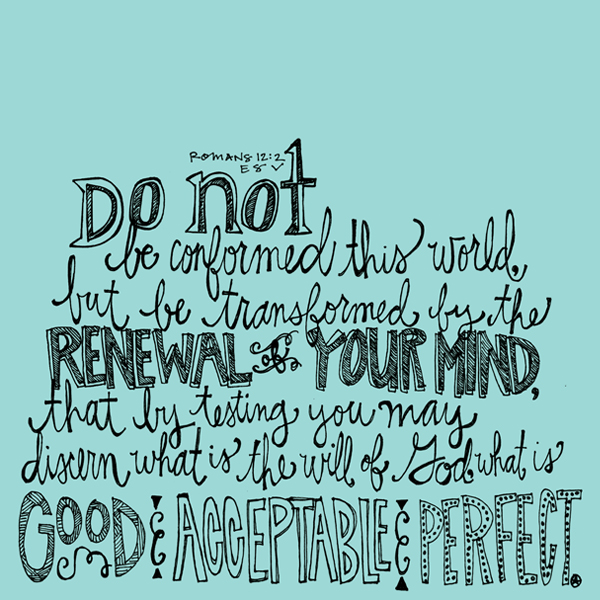 central to the possibility of being “transformed.” We dare not be “conformed”–squeezed in to the mold of, as Phillips puts it— to the typical ideas that are commonplace on the political left or the political right without a conscientious and intentional move to think things through in light of a B
central to the possibility of being “transformed.” We dare not be “conformed”–squeezed in to the mold of, as Phillips puts it— to the typical ideas that are commonplace on the political left or the political right without a conscientious and intentional move to think things through in light of a B
iblical framework. “Don’t be taken captive” by these sorts of ideologies, Paul shouts, and that holds for those who are drifting towards a socialist vision and those who are drifting towards a neo-con view of the market or an Randian view of human liberty; from MoveOn to the Tea Party, I sense that their foundational ideas are coming not from the Bible, but from political philosophers who themselves may not be consistent with a Biblical viewpoint. That is, I am less interested, at first, about what Noam Chomsky or Thomas Jefferson says about liberty or the state or what is or isn’t self-evident and I am firstly interested in what the Bible says.
(An aside: I want to tell one of my favorite Mark Twain stories, for what I hope is an honorable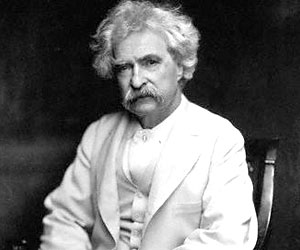 reason. Twain was once asked if he believed in infant baptism. “Believe in it?” he retorted. “Hell, I’ve seen it!” Well, hell, I’ve seen Christian Marxists and Christian Libertarians. I think they are wrong, in violation of the spirit of these two texts about the Christian mind. They should redoubled their reflections on Romans 12:1-2 and pray for a renewed mind so they can show off what God’s will really is, which isn’t Marxism or Libertarianism, at least not according to how the church has traditionally understood the Bible’s view of these things. But, having said that, Twain was right. There are folks who identify themselves that way and as incoherent as I find their views, some of them are my friends, and I honor them as such.)
reason. Twain was once asked if he believed in infant baptism. “Believe in it?” he retorted. “Hell, I’ve seen it!” Well, hell, I’ve seen Christian Marxists and Christian Libertarians. I think they are wrong, in violation of the spirit of these two texts about the Christian mind. They should redoubled their reflections on Romans 12:1-2 and pray for a renewed mind so they can show off what God’s will really is, which isn’t Marxism or Libertarianism, at least not according to how the church has traditionally understood the Bible’s view of these things. But, having said that, Twain was right. There are folks who identify themselves that way and as incoherent as I find their views, some of them are my friends, and I honor them as such.)
So, we need to “think Christianly” about the basic stuff that makes up our political views. We need to use our minds and allow the Bible to be the “light before our path” as it scrutinizes and informs our views and loyalties.
Yet, to do this Biblical work to develop a truly Christian political mind we must hear what brothers and sisters across time and across the globe have said about the relevant Biblical texts and consider what sort of public theology they have developed. Others before us, some in other places and in other contexts, have done the hard work of proposing a uniquely Christian view of society, the role of the state, the nature of human liberty, our duties to the common good, the significance of civil society, and the prudence of this or that legal or legislative agenda, and we who are Christians should stand on their shoulders.
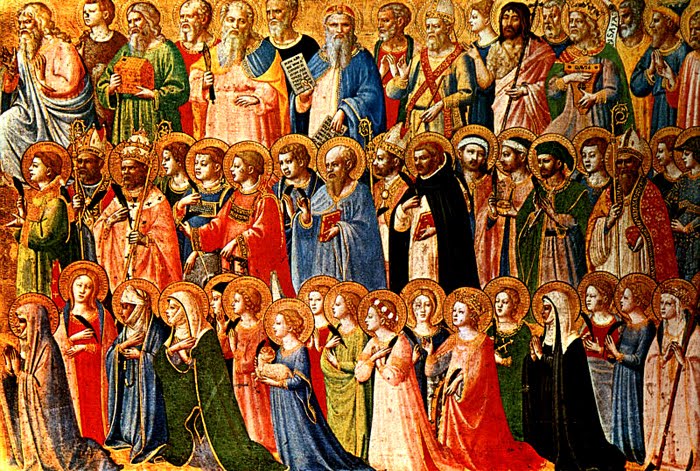 From Augustine to Luther, Calvin to Menno Simons, Wesley to Wilberforce to Witherspoon, from the new England Puritans (and Roger Williams, God bless his freedom loving soul!) to Catholic human rights leaders like Bartolome de Las Casas, from the famous Catholic encyclical Rerum Novarum to Populorum Progressio, from Abraham Kuyper in Holland to Martin King in Alabama, from the pronouncements of the National Council of Churches and our mainline denominations and the NAE’s “For the Health of the Nation” document, there have been many, many thinkers and political leaders who have been steeped in Scripture and engaged in the teachings of the church who have much to offer. We don’t have to reinvent the wheel, nor, frankly, listen mostly to Fox News, MSNBC, or Link TV to get our basic orientation.
From Augustine to Luther, Calvin to Menno Simons, Wesley to Wilberforce to Witherspoon, from the new England Puritans (and Roger Williams, God bless his freedom loving soul!) to Catholic human rights leaders like Bartolome de Las Casas, from the famous Catholic encyclical Rerum Novarum to Populorum Progressio, from Abraham Kuyper in Holland to Martin King in Alabama, from the pronouncements of the National Council of Churches and our mainline denominations and the NAE’s “For the Health of the Nation” document, there have been many, many thinkers and political leaders who have been steeped in Scripture and engaged in the teachings of the church who have much to offer. We don’t have to reinvent the wheel, nor, frankly, listen mostly to Fox News, MSNBC, or Link TV to get our basic orientation.
(It is a shame—while I’m on a roll, here— that most Christian bookstores don’t carry much of this sort of thing; of course, there isn’t much of a demand for such books, so maybe I can’t blame them. But there is this legacy of riches and it’s unfortunate that this stuff is not known better among us. Which is why I hope you support our efforts to promote historic resources like this.)
Your—our—overall social vision, our values and theories about government, our views of the role of the state, the relative goodness of taxes, the need to work for the common good, the confidence in the legitimate calling of the government, by God, should be rooted and grounded and driven by Holy Scripture and the unfolding drama of thoughtful Christians trying to fruitfully and faithfully work it out over time. When we weigh in on the issues on facebook or speak out at a local forum or chat over beer in the backyard, we obviously should be humble and civil–please!—but, also, we should try to align our views with the historic, Christian understandings of the nature of institutions in society, the role of the state, and the Bible’s call for public justice for all. In other words, we give witness to new angles of vision that may not be typically right nor left nor centrist and that might appear insightful (or idealist, if your conversation partner doesn’t have a vivid imagination) and might offer fresh ways out of our impasses; moving forward by looking backwards a bit, perhaps. At least it should be clear that we are non-conformed to the ideas of the ideologues, independent thinkers with our loyalties to the Christian tradition as it points us to God’s will for shalom. And part of God’s desire is illustrated by Psalm 72:1, a plea and a prayer, for an ancient ruler that still resonates down through the ages: “Give the King thy justice O Lord.” We want our leaders to be shaped by God’s heart and God’s views and God’s justice.
And so, I will offer some suggestions for a few of the best books (most of which are easy to read, although a few are challenging) that will invite us to think more deeply about a Christian view of politics, and cause us to pause a bit before spouting off on one side or the other, without being aware of the weight of previously taught Christian perspectives and the history of those who have gone before us. And, they are on sale — a healthy 20% off.
If somebody wants to be seriously involved in civic affairs—from blogging to educational work to actual partisan campaign activism—more power to them. But maybe you can help them make sure they don’t tarnish the name of Christ by using faith as an “add on” as if God will just bless “our side.” Left-leaning friends and right-leaning friends, unite on this: we should want some uniquely Christian views that are based on a Biblically-informed understanding of the role of the state and the meaning of politics from a faithful perspective. Give the king Thy Justice, O Lord!
NOT FOR OUR OWN SAKE OR FOR OUR RIGHTS
We can move beyond any ultimate loyalties to either side and agree to be humble and willing to learn from others. We can be winsome and pleasant and agree to disagree about a lot standing united in our civility, our commitment to serve God and our neighbors well. That is because we are not primarily involved in civic life for our own sake — we should be making arguments that are not about us, mostly, or our own rights or privileges, but about God’s will, our neighbors good, and making the whole world a better place, so that God is pleased as all is done in the spirit of Christ who taught us to love everyone, even enemies. Can we church folk agree that whatever political parties or policies we promote, we support them and persuade others to do so because we think their ideas are best for the common good, for the health of the nation and the well-being of others (not just ourselves and our kids or our kind)? As my old friend Gerald Vandezande once put it, “Justice does not mean just-us.”
Romans 13:1-6 gives us a high view of government, something t
hat evangelicals on the right sometimes oddly miss. Of course, this refers to the possibility of government, in theory, which is given by God, the structure for it built into God’s creation, but not any or every particular regime. (As with, say, sexuality, we aren’t opposed to God’s gift of sex because it is sometimes grossly abused. Likewise, we aren’t skeptical of God’s gift of government just because it is sometimes abused.) For those on the political right, this is important: please don’t suggest government is evil, or that “they” are “stealing” “our” money, since that is exactly what they are supposed to do! By the end of Romans 13, besides calling on government to wield authority for justice, and for us to pay taxes, we have been reminded to love all, to not pass judgement, to be humble and good. Maybe these books listed below will help us learn these habits of neighborliness, of respecting our fellow-citizens, and of persuading others to new insights, not because we demean those whose ideas we find wanting, or even because we tout our own views as the best, but because we speak with such love and integrity that something of the grace of Jesus shines through. These are some of the lovely “good works” the Bible says we are ordained to do, so that all will know about our Creator’s love and God will be glorified.


But such trans-partisan, decent, civic-minded, humble, persuasive political advocacy doesn’t just hint at a warm-fuzzy kind of cheap grace, with a quiet sort of tolerant Jesus, but it testifies to a coherent life that is ordered by this world-rocking vision of a true King who has left us with solid truth, truths discovered as we live in His regime. Truth that has public implications, implications that have been struggled with for centuries. Come, join the conversation, not as a partisan Republican or a loyal liberal, not as one whose identity is primarily one who is pro or con the current administration, red or blue. But as one subjected to Christ’s rule, willing to learn from His ways, thinking not as the typical ideologies want us to, but as the Bible demands us to, not being taken captive, but nurturing a prophetic imagination that sees things afresh.
What that looks like isn’t as clear as I’d wish. This is in some ways new territory for many of us; we can be pioneers in a new kind of politics, based at least somewhat on the broad consensus of those who have thought about a uniquely and properly Christian vision for public life and responsible citizenship. Admittedly, it’s complicated. These books can help.
Here’s your guide to some greater insight and clarity and faithfulness.
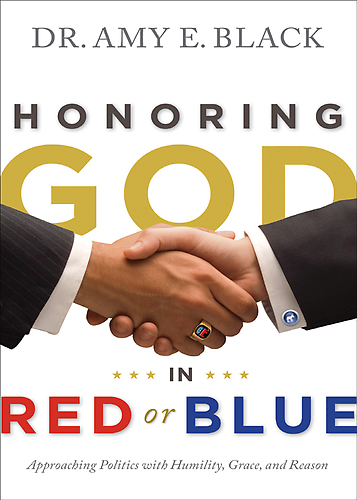 Honoring God in Red or Blue: Approaching Politics with Humility, Grace, and Reason Amy Black (Moody Publishers) $14.99 Okay, let’s start simply. I just had a review that I did of this short book published in the column I write in Capitol Commentary of The Center for Public Justice (CPJ.) They are a think-tank and educational outreach about citizenship and public life, and some of their former leaders (like Dr. James Skillen, Gideon Struass) have been important voices on this perspective for years They do the sorts of integrated thinking about which I ruminated above. So here’s the little review I wrote for them about this book.
Honoring God in Red or Blue: Approaching Politics with Humility, Grace, and Reason Amy Black (Moody Publishers) $14.99 Okay, let’s start simply. I just had a review that I did of this short book published in the column I write in Capitol Commentary of The Center for Public Justice (CPJ.) They are a think-tank and educational outreach about citizenship and public life, and some of their former leaders (like Dr. James Skillen, Gideon Struass) have been important voices on this perspective for years They do the sorts of integrated thinking about which I ruminated above. So here’s the little review I wrote for them about this book.
As most of us know, CPJ has several goals. Besides serious reflection of the sort done by think-tanks and some occasional legislative advocacy, the Center helps advance the cause of Christian folks taking their citizenship seriously and learning to do so more faithfully. For this, we need clear, useful resources that make the case that part of gospel-centered discipleship includes our political lives. Such vision-casting needs be interesting and accessible. This new book by a respected evangelical scholar and friend of the Center, Wheaton College professor Amy Black, is a perfect example of just this sort of resource. It is insightful about the Biblical call to enact justice in the public square as well as foundational ideas about political philosophy (what is the task of the state, after all?) Black also explains in interesting ways how bills become laws, how parties work and a bit about basic democratic proceedings. There are good discussion questions after each chapter including some ideas for greater involvement, making this fabulous for small group use or adult education classes. The Center for Public Justice CEO Stephanie Summers also endorses the book, affirming its thoughtful, non-partisan perspective. Summers writes:
For Christian citizens who are weary from the fighting that too often characterizes current engagement in politics and are looking instead for a God-honoring approach, Black’s book is a healing balm. The good news: God cares about government and gives it, as well as citizens and other institutions in society, important roles to play and corresponding responsibilities to fulfill. This book invites readers not only to hope again, but to think deeply before deliberately taking action.
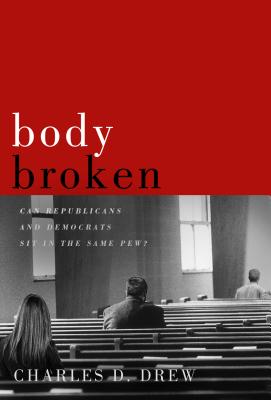 Body Broken: Can Republicans and Democrats Sit in the Same Pew? Charles Drew (New Growth Press) $15.99 This was out years ago as A Public Faith and we appreciated it. I thought it was just so very sensible, wise, even. Now it is updated and expanded, making it a strong, good book to read for anyone wanting a genial and solid study of Christian citizenship. He does a couple of things here in mature and pastoral language, firm, and clear: our unity in Christ precedes and transcends our political differences, so regardless of how strongly we feel about certain issues, those who are in Christ are one. I think the ideas presented in this book will be very, very important for some of us this fall. Yet, we are citizens and whole people, so we certainly shouldn’t avoid in church the implications of our faith for public life–we just have to learn to be thoughtful, theological, fair-minded, balanced and civil. The church, as church, shouldn’t become politicized but should proclaim the gospel in grace for all and create space of us to talk about the implications of God’s Kingdom for all areas of life. Drew (who pastors a church in New York City) is very big on the sorts of things I care about—developing a uniquely Christian view of things, holding up first principles and the most basic ideas, first, and he is candid that good people can disagree. He affirms a diversity of views that, within reason, can be held by faith-based folks, and he shows how to navigate the most urgent issues in thoughtful, faithful ways, without allowing our stances to get in the way of the unity of our faith communities. Drew is a sophisticated thinker and a strong, clear writer and would be good for anyone, including those in churches where there is some conversation going on about politics. Fabulous!
Body Broken: Can Republicans and Democrats Sit in the Same Pew? Charles Drew (New Growth Press) $15.99 This was out years ago as A Public Faith and we appreciated it. I thought it was just so very sensible, wise, even. Now it is updated and expanded, making it a strong, good book to read for anyone wanting a genial and solid study of Christian citizenship. He does a couple of things here in mature and pastoral language, firm, and clear: our unity in Christ precedes and transcends our political differences, so regardless of how strongly we feel about certain issues, those who are in Christ are one. I think the ideas presented in this book will be very, very important for some of us this fall. Yet, we are citizens and whole people, so we certainly shouldn’t avoid in church the implications of our faith for public life–we just have to learn to be thoughtful, theological, fair-minded, balanced and civil. The church, as church, shouldn’t become politicized but should proclaim the gospel in grace for all and create space of us to talk about the implications of God’s Kingdom for all areas of life. Drew (who pastors a church in New York City) is very big on the sorts of things I care about—developing a uniquely Christian view of things, holding up first principles and the most basic ideas, first, and he is candid that good people can disagree. He affirms a diversity of views that, within reason, can be held by faith-based folks, and he shows how to navigate the most urgent issues in thoughtful, faithful ways, without allowing our stances to get in the way of the unity of our faith communities. Drew is a sophisticated thinker and a strong, clear writer and would be good for anyone, including those in churches where there is some conversation going on about politics. Fabulous!
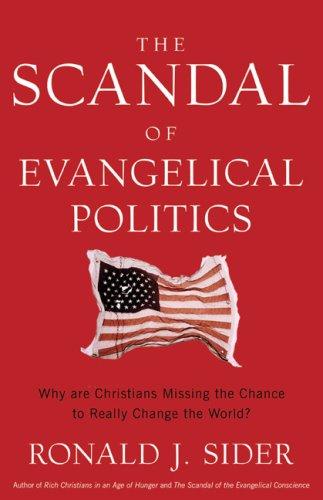 The Scandal of Evangelical Politics Ronald J. Sider (Baker) $15.99 You should know, if you’ve read this column for long, that I esteem Ron Sider immensely, that I appreciate his commitments to the Bible, and his humble spirit. I’ve read every book he’s writ
The Scandal of Evangelical Politics Ronald J. Sider (Baker) $15.99 You should know, if you’ve read this column for long, that I esteem Ron Sider immensely, that I appreciate his commitments to the Bible, and his humble spirit. I’ve read every book he’s writ
ten and am continually amazed at his hopefulness, evangelical zeal, and tireless efforts to get Bible-believing Christians to think faithfully about global realities, societal reformation, and public justice. His Rich Christians in an Age of Hunger has been cited often as one of the most important books of the 20th century, and it has been my privilege to host him here in York, and to be with him at numerous events over the years. I view him as a cherished Christian brother. Sider is not nearly as “single-issue” or extreme as some presume he is. (One of my favorite essays of his was about his joy of fishing and feasting on vacations, despite his reputation for living a “simple lifestyle.” I read and re-read his essay in Prism about the aging of his pious father, after his elderly mother had died.) That he has been called a Marxist is one of the dumber things that critics have written. He grew up a Brethren farm boy and surely doesn’t want the government running everything! He does attend, though, to clear Bible teaching about the authority of the state to pass laws regarding social welfare, an exegetical debate to which he offers much Scriptural knowledge. Beyond exegesis, he is clearer than most that there are legitimate quibbles about how to best enact normative directives into contemporary policies. I can hardly think of another Christian political thinker whose work is more admirable for advancing the right kind of method and process.
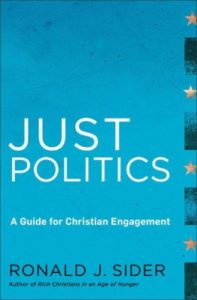 [Addition: a few years ago this book with the red cover was somewhat revised and re-issued with the title Just Politics: A Christian Guide for Engagement published by Brazos Press; $22.00. It is excellent, offering a methodology for discern something akin to a “Christian perpsective” on basic matters, out of which wise policies and positions can be developed. It’s one of the most useful tools I know for nurturing skills at “thinking Christianly” about politics and policy.]
[Addition: a few years ago this book with the red cover was somewhat revised and re-issued with the title Just Politics: A Christian Guide for Engagement published by Brazos Press; $22.00. It is excellent, offering a methodology for discern something akin to a “Christian perpsective” on basic matters, out of which wise policies and positions can be developed. It’s one of the most useful tools I know for nurturing skills at “thinking Christianly” about politics and policy.]
This book, then, — again, now called Just Politics — is passionate and balanced, significantly informed by a variety of perspectives and views. Sider’s fluency in, for instance, the Anabaptist peace witness, the evangelical mainstream, two-thirds world global evangelicals, the Reformed/Kuyperian worldview thinkers, and the mainline/ecumenical contribution, makes him positioned to offer a bird-eyes view of the topic.
(Several years ago Sider co-edited a very important book, Toward an Evangelical Public Policy [Baker; $25.00] with a rather conservative colleague and friend, the late Diane Knippers, about the NAE public policy statement, “For the Health of the Nation,” which they helped draft. The statement, and even more, the book, illustrated a robust, multi-denominational, Biblically-balanced view of a whole batch of issues. It includes more foundational chapters by liberal mainline folks and Catholic scholars, reflecting on their experience trying to influence public policy, making it a truly ecumenical and interesting collection.) So, when in Scandal… Sider teaches us how to follow a faithful methodology of determining a viable Christian view on this topic or that, he has a keen sense of what that may mean, has much experience struggling through the move from Bible to theory to policy, and shows us clearly how it can be done, step by step.
While Scandal of Evangelical Politics/ Just Politics begins by looking at the ways in which evangelicals have, in previous decades, ignored the Biblical commands about justice, the poor, peacemaking, the environment, and the like, his goal is to help any and all Christians develop a solid, Biblical framework and balanced, faitihful agenda. As one with moderately conservative theological views, he takes seriously pro-family matters, is clearly pro-life, and has deep concerns about the erosion of traditional sexual ethics and he does not abandon those concerns supported by social conservatives to advance concerns about poverty and creation-care that are more popular among progressives; he is not a partisan “leftist Christian” nor a part of the Religious Right. No, this fine book proposes am eclectic “third way” which is beyond or other than the typical sides of our typical bi-polar/two-party continuum. This is his call to develop a comprehensive and coherent public philosophy, a comprehensive and coherent view of the state rooted in the Christian mind and a distinctive political philosophy, and, finally, a grace-filled, yet urgent, prophetic witness and action plan for working in favor of God’s ways for public life, across a wide bi-partisan range of issues. It may appear too liberal for some, it may appear too conservative for others, but that may be because our political imaginations are too constrained by these worldly categories and partisan positions, neither of which do full justice to a truly Christian view. As I wrote above, it is problematic that we have foundational loyalties to views and values that are not necessarily Biblical. This book is without a doubt the most thorough study I’ve yet seen of a Biblical view of the state and a Christian view of politics and the process of discovering fruitful policy positions for the average reader.
The scandal of The Scandal of Evangelical Politics is, then, that the politics of at least the spokespersons for the evangelical movement have not been evangelical enough; that is, conservative Protestants have largely not in their political lives been guided by the first things of the gospel, and their positions have not been truly Biblical. Even if you aren’t interested in the specific matter of how and why evangelicals focused so exclusively on abortion and homosexuality, say, and why the far Christian right is not adequately guided by the whole counsel of God, this book is a must-read. It is, actually, less a critique of the Christian right or recent evangelical failures than a vibrant and urgent and persuasive call to get our politics from a coherent and sane and honorable reading of the Bible. It may be one of the most important books I’ve ever seen in this field, good for any denomination or tradition as long as they care about the Bible. I hope it can convince a new generation of evangelical folk–and anybody else who cares— to “think Christianly” and commit to a truly Biblical civic agenda.
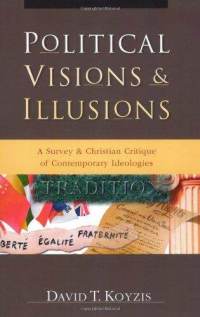 Political Visions and Illusions: A Survey & Christian Critique of Contemporary Ideologies David T. Koyzis (IVP) $20.00 Okay, I trot this out nearly every year when there are elections or political debates or if there are matters on the news that seem to exhibit the “culture wars” debates. And now is that time, for sure. This is a very serious work, exposing the background ideas and philosophical foundations of both right and left wing writers, pundits, movements. It grapples with the “every thought captive” idea as I suggested above, digging around the ground from which both conservative and liberal political thinking has come. In this complex and important book Koyzis adeptly explains where ideas come from, what principled liberals and conservatives really believe (or assume) and whether those guiding ideals do or do not comport with a consistently Christian worldview. How do legitimate ideas end up becoming idols and get hardened into ideologies? What are the dynamics of ideological conflict in our new century? Why does the typical “liberal vs conservative” story not really do justice to the more complex realities behind political movements? This is beyond astute, it is genius, the best and most comprehensive overview of political thinking that I know of. It uses words appropriately, explaining how political philosophers have used phrases and ideas in the past, and helps us all get a handle on what is going on in our heated civic debates. Highly recommended, although it takes some deliberate study. If you are passionate about the political stuff goi
Political Visions and Illusions: A Survey & Christian Critique of Contemporary Ideologies David T. Koyzis (IVP) $20.00 Okay, I trot this out nearly every year when there are elections or political debates or if there are matters on the news that seem to exhibit the “culture wars” debates. And now is that time, for sure. This is a very serious work, exposing the background ideas and philosophical foundations of both right and left wing writers, pundits, movements. It grapples with the “every thought captive” idea as I suggested above, digging around the ground from which both conservative and liberal political thinking has come. In this complex and important book Koyzis adeptly explains where ideas come from, what principled liberals and conservatives really believe (or assume) and whether those guiding ideals do or do not comport with a consistently Christian worldview. How do legitimate ideas end up becoming idols and get hardened into ideologies? What are the dynamics of ideological conflict in our new century? Why does the typical “liberal vs conservative” story not really do justice to the more complex realities behind political movements? This is beyond astute, it is genius, the best and most comprehensive overview of political thinking that I know of. It uses words appropriately, explaining how political philosophers have used phrases and ideas in the past, and helps us all get a handle on what is going on in our heated civic debates. Highly recommended, although it takes some deliberate study. If you are passionate about the political stuff goi
ng on these days, and find yourself involved with (or weary of) the movements and spokespersons, this will allow you to think it through very carefully, philosophically, and allow you, in God’s grace, towards a more incisive understanding of the strengths and weaknesses of each camp. If you know any smart political journalists or activists who are serious about faith, I hope you buy a copy of this for them.
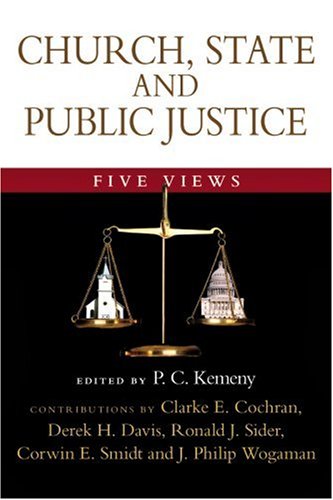 Church, State and Public Justice: Five Views edited by P.C. Kemeny ( IVP; $19.00) This back and forth debate type book shows that there are several major traditions or “schools of thought” operative within the church these days, and allows a proponent of each view a shot at explaining his view. Then the other four, each representing their own particular understanding of the nature of a Christian view of politics, replies. You get five views and each person critiquing the others, making for a learning experience that is rich and diverse—many college courses for which you’d pay hundreds of dollars wouldn’t teach you this much. It does, mostly, show the general commonality of the discourse (that is, they agree on a lot) despite the very large differences of opinion on many details. That is, they all agree that there should be something like a Biblically-based, theologically-driven, understanding of the relationship of faith and politics, but they differ on what that actually looks like. The five views represented include a very thoughtful Roman Catholic view consistent with Catholic social teaching, a liberal main-line Protestant proposing a standard social gospel view, an Anabaptist/pacifist Mennonite view, a Kuyperian, Reformed “pluralist” view and a strict separationist Baptist view. I like this because it reminds us of the differing nuances and views—the media and many Christian pundits do us a disservice by suggesting that there are only “left and right” or “the religious right and the secular left” or “progressives and fundamentalists.” It is more complex, more interesting, more challenging, and more important than that overly simple way that plays to culture wars. A great, great resource for serious Christians wanting the big picture of this specific topic.
Church, State and Public Justice: Five Views edited by P.C. Kemeny ( IVP; $19.00) This back and forth debate type book shows that there are several major traditions or “schools of thought” operative within the church these days, and allows a proponent of each view a shot at explaining his view. Then the other four, each representing their own particular understanding of the nature of a Christian view of politics, replies. You get five views and each person critiquing the others, making for a learning experience that is rich and diverse—many college courses for which you’d pay hundreds of dollars wouldn’t teach you this much. It does, mostly, show the general commonality of the discourse (that is, they agree on a lot) despite the very large differences of opinion on many details. That is, they all agree that there should be something like a Biblically-based, theologically-driven, understanding of the relationship of faith and politics, but they differ on what that actually looks like. The five views represented include a very thoughtful Roman Catholic view consistent with Catholic social teaching, a liberal main-line Protestant proposing a standard social gospel view, an Anabaptist/pacifist Mennonite view, a Kuyperian, Reformed “pluralist” view and a strict separationist Baptist view. I like this because it reminds us of the differing nuances and views—the media and many Christian pundits do us a disservice by suggesting that there are only “left and right” or “the religious right and the secular left” or “progressives and fundamentalists.” It is more complex, more interesting, more challenging, and more important than that overly simple way that plays to culture wars. A great, great resource for serious Christians wanting the big picture of this specific topic.
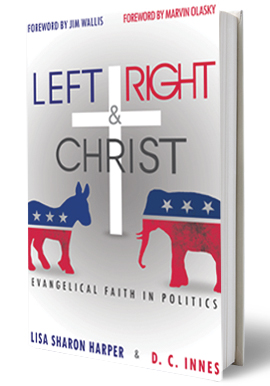 Left, Right & Christ: Evangelical Faith in Politics Lisa Sharon Harper & D.C. Innes (Russell Media) $22.99 All right — I’ve been idealistic and invited you to think outside the box of “left vs right” and to study a “third way” option that draws on the best of radical Christian thinkers that have robust imaginations which generate trans-partisan political ideas. I don’t think we should wallow in the simple two-sided debate. I’ve suggested books that I think are very important. But, let’s face it, most of our fellow citizens (and, unfortunately, the best known candidates) are aligned with one of the two major parties, representing one of two major ideologies. So, as the election season proceeds I am sure I will revisit this good book, drawing on each author’s important points as I write, teach, and talk about a Christian perspectives on politics. Perhaps it will serve you in such a way as well.
Left, Right & Christ: Evangelical Faith in Politics Lisa Sharon Harper & D.C. Innes (Russell Media) $22.99 All right — I’ve been idealistic and invited you to think outside the box of “left vs right” and to study a “third way” option that draws on the best of radical Christian thinkers that have robust imaginations which generate trans-partisan political ideas. I don’t think we should wallow in the simple two-sided debate. I’ve suggested books that I think are very important. But, let’s face it, most of our fellow citizens (and, unfortunately, the best known candidates) are aligned with one of the two major parties, representing one of two major ideologies. So, as the election season proceeds I am sure I will revisit this good book, drawing on each author’s important points as I write, teach, and talk about a Christian perspectives on politics. Perhaps it will serve you in such a way as well.
As you might guess, this is a co-authored debate-style book, with a Christian who is a committed Democrat and a Christian who is a committed Republican each explaining how their faith and Biblical insights compel them to align themselves (even if always provisionally, as they both insist) towards more-or-less liberal or conservative public policies. D.C. Innes is a popular professor of political science at The Kings College in New York (and an Orthodox Presbyterian minister) while Ms Harper is an activist for Sojourners in DC who has worked with InterVarsity Christian Fellowship. They are friends and friendly, and both offer remarkable amounts of helpful insight.
Marvin Olasky writes one forward to Left, Right, and Christ; he is known for his insistence on a staunchly conservative Christian worldview (he writes for World magazine) and he says here “If this isn’t a conversation starter for Christians, than nothing else will be.” Jim Wallis of the lefty Sojourners has another forward, again noting that this book will certainly stimulate good discussion and deep thinking. That both commend it is pretty awesome. You get the point: this is ideal for book clubs, conversation-starters, to tweak our ideas by reading more than just one viewpoint, to give to that person who just doesn’t get your viewpoint. There are six or seven endorsements on the inside, each by folks I really respect (who hold to pretty diverse socio-political viewpoints) such as Carl Trueman and John Anderson, Jonathan Merritt and Nicole Baker Fulgham. David Gushee says “One might have thought there was nothing new to say in or about this burnt-over district, but in their sharp, yet civil, dialogue Innes and Harper offer provocative and creative new reflections.” Thanks to Mark Russell for his good work in shepherding this project and for designing such an attractive, clear, fair-minded, interesting, contemporary book. Here is a great little video of the two of them in a nice promo video.
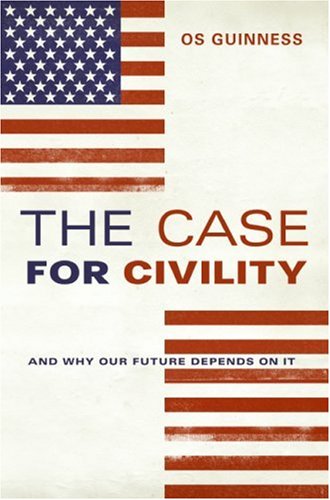 The Case for Civility: And Why Our Future Depends on It Os Guinness (HarperOne) $23.95 I reviewed this when it came out, declaring my huge appreciation for it, and have mentioned it time and again. One needn’t agree with all the proposals but it is a must-read for anyone interested in conversations about church and state, faith in public life, and the like. This is not just about public manners or civil etiquette—which itself would be helpful, but not quite the point of this volume— as Guinness here explores how the first amendment offers a framework for freedom for and from religion. We must not move towards any God-based theonomy or any kind of state church, of course. But a “naked public square” that privileges secularism is equally faulty and unfair. This “case” challenges the religious right and the secular left calling us all to take steps to solve the impasse of of our times through what he wonderfully explains in vigorous and inspiring prose as a “cosmopolitan public square.” I do hope you consider reading this and living out his important vision and urgent call to decency, civility, and, urgently, a robust commitment to the principles of our First Amendment. If you tend to be liberal and are annoyed by Christians wanting their values enacted, this will help you appreciate the legitimacy of their desires (if not the substance of any particular policy they propose.) If you tend to be conservative and are annoyed by liberals who think you should just keep your faith out of things, this might help you learn to be more civil and to counter their resistance in ways that are democratic and reasonable and compelling. Here is a long C-Span interview with Dr. Guinness. Watch the first six minutes, at least, to get a sense of what this thoughtful book is like. Oh go on, listen to it all — this is so very good, and it is very helpful to see how he is so quick on his feet, even with some pretty embarrassingly bad questi
The Case for Civility: And Why Our Future Depends on It Os Guinness (HarperOne) $23.95 I reviewed this when it came out, declaring my huge appreciation for it, and have mentioned it time and again. One needn’t agree with all the proposals but it is a must-read for anyone interested in conversations about church and state, faith in public life, and the like. This is not just about public manners or civil etiquette—which itself would be helpful, but not quite the point of this volume— as Guinness here explores how the first amendment offers a framework for freedom for and from religion. We must not move towards any God-based theonomy or any kind of state church, of course. But a “naked public square” that privileges secularism is equally faulty and unfair. This “case” challenges the religious right and the secular left calling us all to take steps to solve the impasse of of our times through what he wonderfully explains in vigorous and inspiring prose as a “cosmopolitan public square.” I do hope you consider reading this and living out his important vision and urgent call to decency, civility, and, urgently, a robust commitment to the principles of our First Amendment. If you tend to be liberal and are annoyed by Christians wanting their values enacted, this will help you appreciate the legitimacy of their desires (if not the substance of any particular policy they propose.) If you tend to be conservative and are annoyed by liberals who think you should just keep your faith out of things, this might help you learn to be more civil and to counter their resistance in ways that are democratic and reasonable and compelling. Here is a long C-Span interview with Dr. Guinness. Watch the first six minutes, at least, to get a sense of what this thoughtful book is like. Oh go on, listen to it all — this is so very good, and it is very helpful to see how he is so quick on his feet, even with some pretty embarrassingly bad questi
ons. And he is asked at the end why an intellectual like himself is a Christian. Wow. Os, you may know, is a friend and hero. Check him out.
I am a fan of this helpful Case for Civility (and commend it even if you don’t agree with all of it) and suggest that it is very useful for all of us. It is serious, but, as always with Os, it
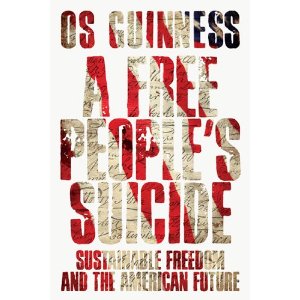 is wonderfully written, based on his wide reading, but aimed at helping ordinary citizens help our culture heal, working for a framework that honors the first ammendment and a civil public square. Read it soon, as he will have a new blockbuster paperback on these issues coming late this summer. The forthcoming one will be called A Free People’s Suicide: Sustainable Freedom and the American Future (IVP; $16.00) and I have already read an early manuscript. It is a very important, eloquent manifesto, indeed. I’ll dedicate a full review of it when it comes out. You can pre-order it now from us, if you’d like.)
is wonderfully written, based on his wide reading, but aimed at helping ordinary citizens help our culture heal, working for a framework that honors the first ammendment and a civil public square. Read it soon, as he will have a new blockbuster paperback on these issues coming late this summer. The forthcoming one will be called A Free People’s Suicide: Sustainable Freedom and the American Future (IVP; $16.00) and I have already read an early manuscript. It is a very important, eloquent manifesto, indeed. I’ll dedicate a full review of it when it comes out. You can pre-order it now from us, if you’d like.)
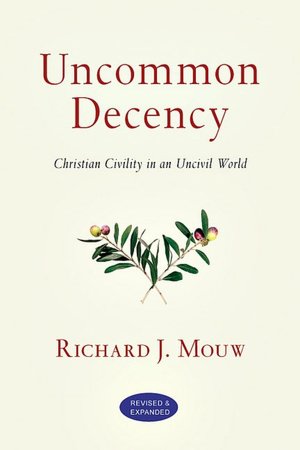 Uncommon Decency: Christian Civility in an Uncivil World (Revised and Expanded) Richard Mouw (IVP) $16.00 Here is what I wrote a year ago when this book was re-issued in an expanded version, explaining that it is one of my all time favorite books. It, too, would make a great, fun, study this fall and it isn’t difficult reading at all.
Uncommon Decency: Christian Civility in an Uncivil World (Revised and Expanded) Richard Mouw (IVP) $16.00 Here is what I wrote a year ago when this book was re-issued in an expanded version, explaining that it is one of my all time favorite books. It, too, would make a great, fun, study this fall and it isn’t difficult reading at all.
I have loved—loved!—this book in the past and am giddy that it is now available in an updated, expanded edition. A graceful new cover reminds us of the not-so-common grace that is called for as people debate public issues. From sexuality to religion in public, from Biblical disagreements (about sexuality, or hell, say) to political discourse, this book reminds us of the need for public etiquette, for the need for persuasion and respect. Rich Mouw is very wise, he’s a clear writer, and his instincts about complex things like “toleration” are so very helpful (and needed perhaps now more than in recent memory!) I’ve said in print before that I know of no other writer who is as clear about his own deep convictions and yet is so willing to listen well to others, to name the places of commonality, the stuff he appreciates in other traditions (even those with whom he shares very important disagreements.) He is candid about those with whom he respectfully disagrees and such humble candor is noteworthy, if not rare. One gets the sense that not only is Rich a broad-minded thinker, it is clear that he thinks from deep within his own tradition, the line of the Dutch neo-Calvinist worldview of Abraham Kuyper that has made him who he is. Yet, the call to gentleness and willingness to learn is clear, even in a favorite chapter “Abraham Kuyper, Meet Mother Theresa.” And, then, the hard chapter “When There Is No Other Hand.” After the Supreme Court rulings this week and the deep frustrations boiling over in the blogosphere, this book and its helpful advice is more urgent then ever. Please, consider buying this. Spread the word—this would make a great book club selection, an adult ed class, or a gift for anyone active or interested in public life. It does not intend to talk much about what constitutes Christian politic ideas; that would be another book. This shows us how to nurture a basic habit of the heart: political etiquette, public manners, being honest and fair and kind. Nice!
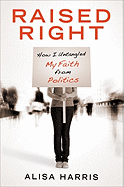 Raised Right: How I Untangled My Faith from Politics Alisa Harris (Waterbook) $14.99 This isn’t exactly a study of balanced and fully Biblical political views, but her sad journey might not have been so weird and dramatic if her family wouldn’t have been so firmly and deeply involved in very, very far-right politics. I’m mostly astonished at this young woman’s story, her being raised in a very active Christian right-wing family—she picketed abortion clinics as a child, holding signs that she surely couldn’t have known what they meant—and becoming active (oooh, how she was active!) in Republican politics as a teenager. This memoir narrates how she has came to a different understanding of her faith through no small amount of serious anguish. Ms Harris is a fantastic writer, making this one of those great memoirs that is easy to read, fun and well-told, and yet very memorable–what a story! Has she just shifted, as many of her twenty-something young evangelical peers have, from a right wing faith to a left wing one? Is her organizing demonstrations at the Bank of America and her advocacy for the poor, at the end of the book just the flip side of her still politicized faith? As she untangles and rethinks things, she lets us look over her shoulder, watch as her rather exciting New York life unfolds, and we get to be a part of the religious coming of age of a very sharp young woman, who is a reporter and fine writer. I suggest that the story isn’t over and I predict she will write more. I hope so. I do hope she reads some of the sorts of books I list above. Harris’ conservative family and their passionate political life left its marks, in ways that are good and not so good, and we can all learn from that. One story, one family, one very thoughtful twenty-something. I could hardly put this book down and trust you find pleasure, empathy and insight, regardless of your thoughts about faith, politics, or social justice.
Raised Right: How I Untangled My Faith from Politics Alisa Harris (Waterbook) $14.99 This isn’t exactly a study of balanced and fully Biblical political views, but her sad journey might not have been so weird and dramatic if her family wouldn’t have been so firmly and deeply involved in very, very far-right politics. I’m mostly astonished at this young woman’s story, her being raised in a very active Christian right-wing family—she picketed abortion clinics as a child, holding signs that she surely couldn’t have known what they meant—and becoming active (oooh, how she was active!) in Republican politics as a teenager. This memoir narrates how she has came to a different understanding of her faith through no small amount of serious anguish. Ms Harris is a fantastic writer, making this one of those great memoirs that is easy to read, fun and well-told, and yet very memorable–what a story! Has she just shifted, as many of her twenty-something young evangelical peers have, from a right wing faith to a left wing one? Is her organizing demonstrations at the Bank of America and her advocacy for the poor, at the end of the book just the flip side of her still politicized faith? As she untangles and rethinks things, she lets us look over her shoulder, watch as her rather exciting New York life unfolds, and we get to be a part of the religious coming of age of a very sharp young woman, who is a reporter and fine writer. I suggest that the story isn’t over and I predict she will write more. I hope so. I do hope she reads some of the sorts of books I list above. Harris’ conservative family and their passionate political life left its marks, in ways that are good and not so good, and we can all learn from that. One story, one family, one very thoughtful twenty-something. I could hardly put this book down and trust you find pleasure, empathy and insight, regardless of your thoughts about faith, politics, or social justice.
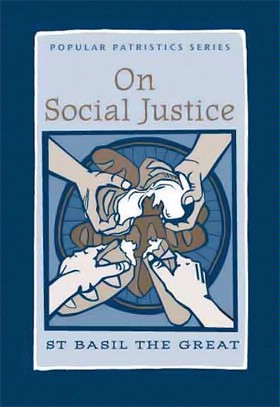 On Social Justice St. Basil the Great (St. Vladimir’s Seminary Press) $15.00 It is important to realize that, these sermons were proclaimed long before representative democracy, even before the rise of the modern nation state. (See, by the way, Calvin in the Public Square: Liberal Democracies, Rights, and Civil Liberties by David W. Hall [Presbyterian & Reformed; $19.99] for a very important study that shows how the Calvinist Reformation influenced these rising notions and institutions.) But, still, the power of these passionate words by the famous church leader, written 1600 years ago, about wealth, the demands of the poor upon us, the evils of usary, including stern words for lenders who abuse their power, might offer us an important reminder about the needs of the poor, the dangers of debt, and how Christians must care for their neighbors and the institutions that may do them great harm.
On Social Justice St. Basil the Great (St. Vladimir’s Seminary Press) $15.00 It is important to realize that, these sermons were proclaimed long before representative democracy, even before the rise of the modern nation state. (See, by the way, Calvin in the Public Square: Liberal Democracies, Rights, and Civil Liberties by David W. Hall [Presbyterian & Reformed; $19.99] for a very important study that shows how the Calvinist Reformation influenced these rising notions and institutions.) But, still, the power of these passionate words by the famous church leader, written 1600 years ago, about wealth, the demands of the poor upon us, the evils of usary, including stern words for lenders who abuse their power, might offer us an important reminder about the needs of the poor, the dangers of debt, and how Christians must care for their neighbors and the institutions that may do them great harm.
AND TWO BIG ACADEMIC ANTHOLOGIES
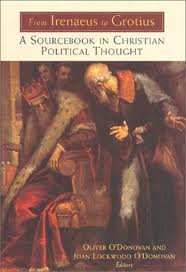 From Irenaeus to Grotius: A Sourcebook in Christian Political Thought edited by Oliver O’Donovan and Joan Lockwood O’Donovan (Eerdmans) $64.00 Okay, this isn’t for everybody, but it sure would be good if every church had one in their church library. If you are doing any academic work in political theory, or if you are active in speaking out as a Christian citizen or pundit, this is the masterpiece collection of some of the earliest sources from the first century fathers up to Grotius, who, it could be argued, influenced the West with gr
From Irenaeus to Grotius: A Sourcebook in Christian Political Thought edited by Oliver O’Donovan and Joan Lockwood O’Donovan (Eerdmans) $64.00 Okay, this isn’t for everybody, but it sure would be good if every church had one in their church library. If you are doing any academic work in political theory, or if you are active in speaking out as a Christian citizen or pundit, this is the masterpiece collection of some of the earliest sources from the first century fathers up to Grotius, who, it could be argued, influenced the West with gr
ound-breaking ideas on the nature of human rights. Almost 900 big pages. We need a second equally astute volume, but for now, this is a treasure-chest of primary source readings and an essential resource for serious thinkers. Amazing.
An Eerdmans Reader in Contemporary Political Theology edited by William Cavanaugh,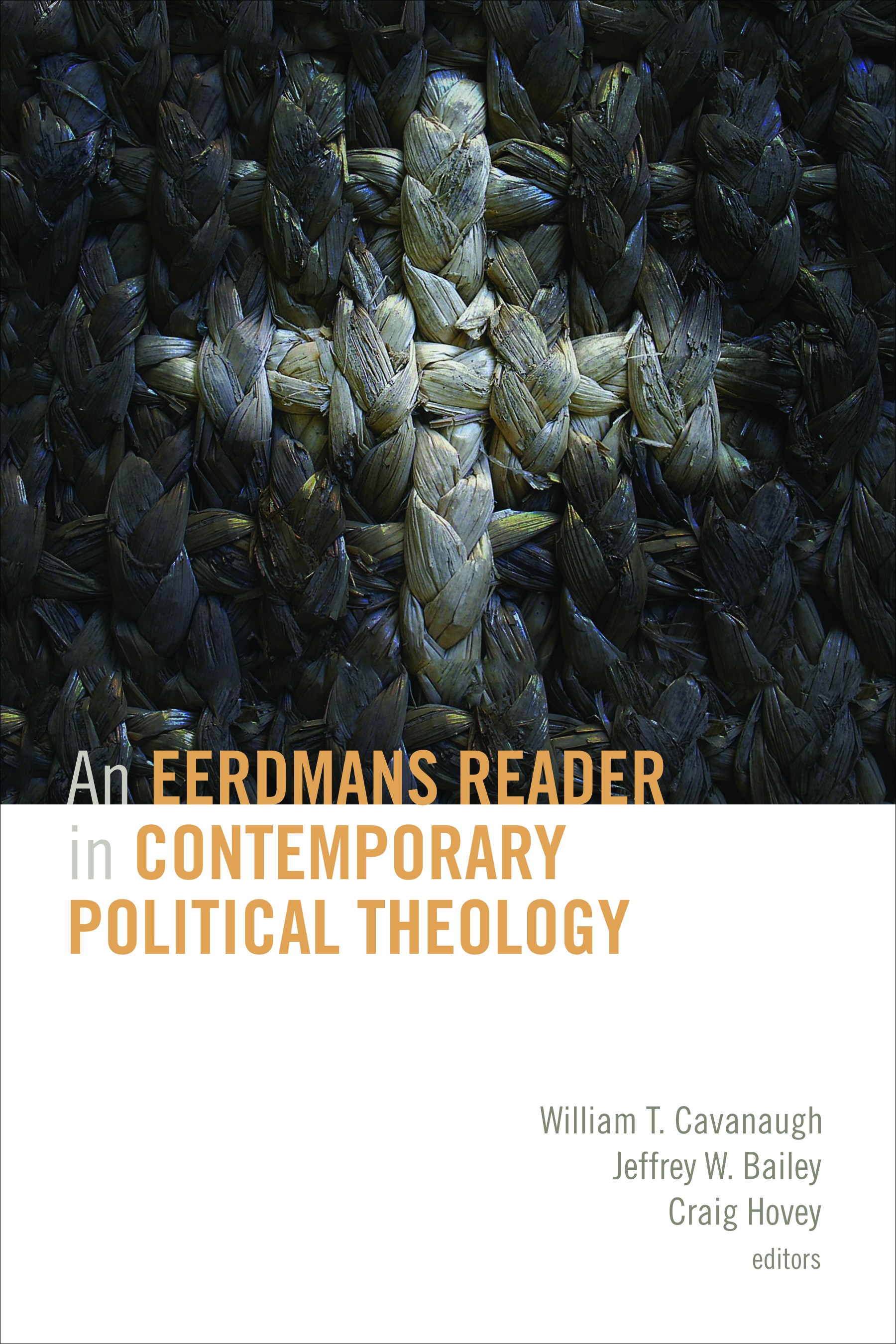 Jeffrey Bailey, and Craig Hovey (Eerdmans) $50.00 When we got this book in the shop a month or so ago, I couldn’t believe my eyes. It includes truly some of the most significant and influential political theology of the 20th and 21st century, writings from all over the globe. This includes radical stuff indeed, post-colonial, prophetic critiques of power, some pretty arcane. But some of the pieces are truly representative, making this a great primary-source reader of 49 major essays. From Barth, Bauckham, Bonhoeffer to Cone, Gutierrez and Hauerwas; from Jean Bethke Elshtain to John Courtney Murray. Where else do you see Ched Myers and Delores Williams alongside both the Niebuhrs and conservative Catholic, George Weigel? I love that they have classic writers like Johann Baptist Metz and Alexander Schmemann and John Howard Yoder alongside third world women activists and global theologians like Desmond Tutu and Emmanuel Kotongole. One drawback is that many are very academic, and most are, as the title suggests, examples of political theology or social ethics, not political theory, as such. Still this is an important new sourcebook for those who really want to dig in.
Jeffrey Bailey, and Craig Hovey (Eerdmans) $50.00 When we got this book in the shop a month or so ago, I couldn’t believe my eyes. It includes truly some of the most significant and influential political theology of the 20th and 21st century, writings from all over the globe. This includes radical stuff indeed, post-colonial, prophetic critiques of power, some pretty arcane. But some of the pieces are truly representative, making this a great primary-source reader of 49 major essays. From Barth, Bauckham, Bonhoeffer to Cone, Gutierrez and Hauerwas; from Jean Bethke Elshtain to John Courtney Murray. Where else do you see Ched Myers and Delores Williams alongside both the Niebuhrs and conservative Catholic, George Weigel? I love that they have classic writers like Johann Baptist Metz and Alexander Schmemann and John Howard Yoder alongside third world women activists and global theologians like Desmond Tutu and Emmanuel Kotongole. One drawback is that many are very academic, and most are, as the title suggests, examples of political theology or social ethics, not political theory, as such. Still this is an important new sourcebook for those who really want to dig in.
SPECIAL
DISCOUNT
any book mentioned
2O% off
order here
takes you to the secure Hearts & Minds order form page
just tell us what you want
inquire here
if you have questions or need more information
just ask us what you want to know
